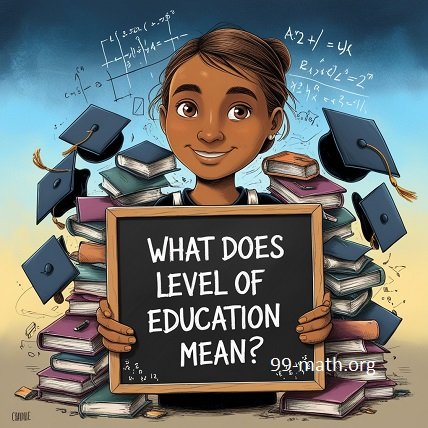Introduction
In order to shape both the lives of individuals and society at large, education is essential. The phrase level of education is frequently used while talking about education. But what does it really mean The notion of an individual’s what does level of education mean is broad and can include various levels of formal schooling, as well as credentials and lifelong skills. The purpose of this blog post is to explore the meaning of the term level of education, its components, and the ways in which it affects both professional and personal development.
Defining Level of Education
The greatest level of education that an individual has attained is referred to as their what does level of education mean. It is a common method used in academic research, job applications, surveys, and demography to classify people according to their level of education. This group covers everything from advanced degrees like doctorates to basic education like elementary school.
The Different Levels of Education
Usually, education is broken down into multiple discrete stages, with each level acting as a foundation for the subsequent level of learning. Primary, secondary, tertiary, and quaternary what does level of education mean are typically included in these levels. Every level denotes a distinct phase in the learning process, defined by certain goals, courses, and results. The foundation is laid with fundamental literacy and numeracy abilities in primary education. More specific information is added to this base in secondary education.
Primary Education: The Foundation
The first phase of formal what does level of education mean, sometimes referred to as basic education or primary education, lays the groundwork for all subsequent learning. It usually starts when a child is five or six years old and lasts for six to eight years, depending on the educational system of the nation. Children at this level are expected to learn the fundamentals of reading, writing, and math in addition to receiving an introduction to science, social studies, and physical education.
Secondary Education: Building Knowledge
After what does level of education mean, secondary education is usually split into two phases: middle school, or lower secondary, and high school, or upper secondary. Because it fills the gap between basic education and postsecondary education or vocational training, this stage of education is very important. Students are exposed to a wider and more varied curriculum in secondary school, covering topics like math, science, languages, humanities, and the arts.
Tertiary Education: Advanced Learning
The level of what does level of education mean that comes beyond secondary school is known as tertiary education, or higher education. This covers academic, professional, and technical programs offered by universities, colleges, and vocational schools that result in degrees, diplomas, or certificates. Providing students with the advanced knowledge and specialized skills needed for professional occupations or research in particular subjects is the main goal of postsecondary education.
Quaternary Education: Specialized and Postgraduate Studies
Advanced degrees beyond the undergraduate level, such as what does level of education mean‘s degrees, doctorates, and specialized professional certifications, are referred to as quaternary education. This level of education is extremely focused on gaining competence in a particular field of study and is highly specialized and research-intensive. People who want to work in academia, research, or high-level professional tasks that need in-depth knowledge and analytical skills usually pursue quaternary education. As an instance, a Ph.D.
Non-Formal Education and Lifelong Learning
Learning that occurs outside of the official educational system, frequently in a more flexible and casual setting, is referred to as non-formal what does level of education mean. This covers online courses, professional development workshops, community-based learning, and adult education programs. Non-formal education is frequently more suited to the needs and objectives of the individual than formal education, which follows a set curriculum and results in credentials that are acknowledged. It enables people to stay current on information, pick up new skills, and adjust to changes in their personal or professional lives.
Vocational Education and Training (VET)
The goal of what does level of education mean and training, or VET, is to provide people with the information and skills necessary for specialized occupations or trades. The practical application of skills in real-world situations is emphasized in Vocational Education and Training (VET) as opposed to traditional academic education, which prioritizes theoretical knowledge. Technical schools, community colleges, and specialized organizations provide Vocational Education and Training (VET) programs, which frequently comprise apprenticeships, internships, and on-the-job training.
Conclusion
A key conceptual framework for comprehending an what does level of education mean‘s educational accomplishment is the “level of education” idea. It includes non-formal and vocational education in addition to different phases of formal education, ranging from basic to quaternary. An individual’s educational attainment has a significant impact on their social mobility, professional opportunities, and personal growth. Education is still a major force behind social advancement and creativity even as it changes.
FAQ
Read more about: how2-invest.net
What is the highest what does level of education mean?
A doctoral degree, which includes Ph.D. and professional degrees like M.D. or J.D., is normally the highest level of education.
How does the what does level of education mean affect career prospects?
Greater employment prospects, greater pay, and more work security are typically associated with higher education levels.
What is the difference between formal and non-formal education?
Formal education is defined as organized learning that occurs in colleges and universities and results in degrees that are accepted. Learning that takes place in non-traditional venues, like workshops, online classes, and community initiatives, is referred to as non-formal education.

